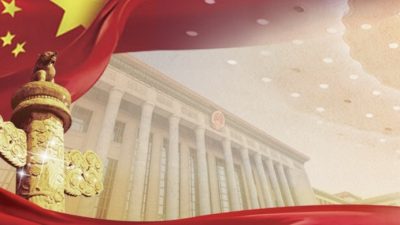China’s “Two Sessions” in Beijing Against a Backdrop of COVID-19

Even though it’s being held on its home turf, Beijing will play second fiddle for the next week as thousands of delegates pour into the capital to debate, argue and socialize amid the “Two Sessions”.
The sessions, taking place after being postponed in March due to COVID-19, are the Chinese People’s Political Consultative Conference, an advisory body drawn from delegates representing a cross-section of society, including the arts, medicine, transport, construction, and the National People’s Congress, the top legislative body.
In reality, the NPC is an exercise in public relations, a supreme example of rubber-stamping. Nothing of any merit will be discussed openly. TV coverage will highlight the mass, synchronized applause of the 2,975 delegates, led by the People’s Liberation Army with the most delegates at 294, followed not by Beijing, or Shanghai but Shandong, the most populous province, with 173 delegates.
Obviously, the COVID-19 outbreak will be presented as a challenge that China met successfully. The catastrophic initial mistakes, the denials, the harassment of doctors trying to publicize its danger, the mass gathering in January that saw tens of thousands of people openly celebrate Chinese New Year in a huge square, will not be mentioned. But neither will there be a sense of triumphalism. The virus remains a concern and seems, at the moment, to be under control but everyone knows it is far too early to declare absolute victory.
The importance of the “Two Sessions” is that it allows leaders of the provincial parties to come to Beijing and discuss, privately, their concerns. China is a one-party state. Ultimate political authority, of course, rests with the Chinese Communist Party, whose Politburo Standing Committee, headed by President Xi Jinping, sets policy. So the NPC deputies to the congress will sit politely, row-upon-row in the Great Hall of the People and choreograph their applause. But in the corridors of power, restaurants and hotel lobbies, there will be forthright discussions on the faltering economy, anti-pollution efforts, international affairs, the Trump presidency and how to recalibrate China’s damaged position in the world.
But one other subject will be raised that makes this Two Sessions intriguing for the outside world is that for the first time since Mao passed away in 1976 China does not expect tomorrow to be better than today. The social contract, the implicit unwritten understanding between the party and the people – acceptance of the party’s political primacy in exchange for growing prosperity – is at risk of unraveling.
Most people in China believe that for this contract to be maintained economic growth would have to be in the region of 5-6 percent minimum per year. No one believes it is anywhere near that today. Even before COVID-19 it was probably around 5 percent. After the outbreak it is much less, probably around 2 percent. Unforeseen circumstances. Sure. But unforeseen circumstances can have unforeseen consequences. Beijing cannot turn on the export taps as it did before to get out of trouble because its major overseas markets are also on their knees. And China as a brand has been damaged. Long after this crisis is over there will be a residue of mistrust for things China. Even before COVID-19 there was a growing sense in the West that China, ironically a communist country once considered just a few years ago as the savior of Western capitalism, could not be trusted. Now there is almost unanimous certainty that it is beyond the pale. Frustration in Beijing at growing international isolation and a restive population demanding better living standards could prove to be a potent mix.
*
Tom Clifford is a renowned journalist currently based in Beijing
Note to readers: please click the share buttons above or below. Forward this article to your email lists. Crosspost on your blog site, internet forums. etc.
Featured image is from CGTN

